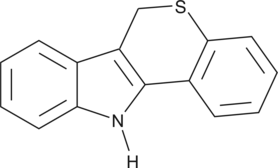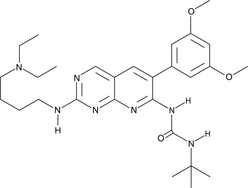Chemicals
Showing 31201–31350 of 41137 results
-
PD 082106 is an inhibitor of FMS-related tyrosine kinase 3 (FLT3; IC50 = 0.015 µM, respectively) and a derivative of indirubin (Item No. 14155).{18155} It is selective for FLT3 over Met, Ron, EGFR, and the insulin receptor (IC50s = >10 µM for all) but does inhibit DRAK2 (IC50 = 0.62 µM), as well as VEGFR2 and Aurora A (IC50s = 1.53 and 1.27 µM, respectively).{18155,46931} PD 082106 inhibits proliferation of A549 lung, SNU-638 stomach, HT-1080 fibrosarcoma, HL-60 leukemia, and MCF-7 breast cancer cells with IC50 values of 13, 2.1, 3.4, 89, and 9 µM, respectively, but does not inhibit proliferation of Col 2 colon cancer cells.{46932} It also inhibits proliferation of (IC50 = 5.1 µM), and induces apoptosis in, K-Ras-transformed RK3D rat kidney epithelial (RK3E-ras) cells and reduces tumor growth in RK3E-ras flank and oral tumor models.{46933} PD 082106 is active against the parasite T. gondii (ID50 = 0.52 µM) with a toxic dose value (TD50) of 61 µM.{46934}
Brand:CaymanSKU:29719 - 10 mgAvailable on backorder
PD 082106 is an inhibitor of FMS-related tyrosine kinase 3 (FLT3; IC50 = 0.015 µM, respectively) and a derivative of indirubin (Item No. 14155).{18155} It is selective for FLT3 over Met, Ron, EGFR, and the insulin receptor (IC50s = >10 µM for all) but does inhibit DRAK2 (IC50 = 0.62 µM), as well as VEGFR2 and Aurora A (IC50s = 1.53 and 1.27 µM, respectively).{18155,46931} PD 082106 inhibits proliferation of A549 lung, SNU-638 stomach, HT-1080 fibrosarcoma, HL-60 leukemia, and MCF-7 breast cancer cells with IC50 values of 13, 2.1, 3.4, 89, and 9 µM, respectively, but does not inhibit proliferation of Col 2 colon cancer cells.{46932} It also inhibits proliferation of (IC50 = 5.1 µM), and induces apoptosis in, K-Ras-transformed RK3D rat kidney epithelial (RK3E-ras) cells and reduces tumor growth in RK3E-ras flank and oral tumor models.{46933} PD 082106 is active against the parasite T. gondii (ID50 = 0.52 µM) with a toxic dose value (TD50) of 61 µM.{46934}
Brand:CaymanSKU:29719 - 5 mgAvailable on backorder
PD 089828 is a competitive inhibitor of the receptor tyrosine kinases FGFR1, PDGFRβ, and EGFR (IC50s = 0.15, 1.76, and 5.47 µM, respectively) and a noncompetitive inhibitor of the nonreceptor tyrosine kinase c-Src (IC50 = 0.18 µM).{38888} It is selective for these targets over insulin receptor tyrosine kinase, PKC, and CDK4 (IC50s = >50 µM) but does inhibit MAPK (IC50 = 7.1 µM). PD 089828 decreases PDGF-BB-, EGF-, and bFGF-induced phosphorylation of PDGFR, EGFR, and FGFR1, respectively, in a concentration-dependent manner in vitro. It also decreases serum-stimulated growth (IC50 = 1.8 µM after 8 days) and migration (IC50 = 4.5 µM) of rat aortic smooth muscle cells.
Brand:CaymanSKU:21435 -Out of stock
PD 089828 is a competitive inhibitor of the receptor tyrosine kinases FGFR1, PDGFRβ, and EGFR (IC50s = 0.15, 1.76, and 5.47 µM, respectively) and a noncompetitive inhibitor of the nonreceptor tyrosine kinase c-Src (IC50 = 0.18 µM).{38888} It is selective for these targets over insulin receptor tyrosine kinase, PKC, and CDK4 (IC50s = >50 µM) but does inhibit MAPK (IC50 = 7.1 µM). PD 089828 decreases PDGF-BB-, EGF-, and bFGF-induced phosphorylation of PDGFR, EGFR, and FGFR1, respectively, in a concentration-dependent manner in vitro. It also decreases serum-stimulated growth (IC50 = 1.8 µM after 8 days) and migration (IC50 = 4.5 µM) of rat aortic smooth muscle cells.
Brand:CaymanSKU:21435 -Out of stock
PD 089828 is a competitive inhibitor of the receptor tyrosine kinases FGFR1, PDGFRβ, and EGFR (IC50s = 0.15, 1.76, and 5.47 µM, respectively) and a noncompetitive inhibitor of the nonreceptor tyrosine kinase c-Src (IC50 = 0.18 µM).{38888} It is selective for these targets over insulin receptor tyrosine kinase, PKC, and CDK4 (IC50s = >50 µM) but does inhibit MAPK (IC50 = 7.1 µM). PD 089828 decreases PDGF-BB-, EGF-, and bFGF-induced phosphorylation of PDGFR, EGFR, and FGFR1, respectively, in a concentration-dependent manner in vitro. It also decreases serum-stimulated growth (IC50 = 1.8 µM after 8 days) and migration (IC50 = 4.5 µM) of rat aortic smooth muscle cells.
Brand:CaymanSKU:21435 -Out of stock
PD 117519 is an adenosine receptor agonist.{45548} It selectively binds to adenosine A2 receptors (IC50 = 30 µM) over A1 receptors (IC50 = 810 µM) in rat brain membranes. PD 117519 increases heart rate and decreases systolic blood pressure in normotensive dogs when administered at doses of 2 or 10 mg/kg.{45547}
Brand:CaymanSKU:28444 - 10 mgAvailable on backorder
PD 117519 is an adenosine receptor agonist.{45548} It selectively binds to adenosine A2 receptors (IC50 = 30 µM) over A1 receptors (IC50 = 810 µM) in rat brain membranes. PD 117519 increases heart rate and decreases systolic blood pressure in normotensive dogs when administered at doses of 2 or 10 mg/kg.{45547}
Brand:CaymanSKU:28444 - 25 mgAvailable on backorder
PD 117519 is an adenosine receptor agonist.{45548} It selectively binds to adenosine A2 receptors (IC50 = 30 µM) over A1 receptors (IC50 = 810 µM) in rat brain membranes. PD 117519 increases heart rate and decreases systolic blood pressure in normotensive dogs when administered at doses of 2 or 10 mg/kg.{45547}
Brand:CaymanSKU:28444 - 5 mgAvailable on backorder
PD 117519 is an adenosine receptor agonist.{45548} It selectively binds to adenosine A2 receptors (IC50 = 30 µM) over A1 receptors (IC50 = 810 µM) in rat brain membranes. PD 117519 increases heart rate and decreases systolic blood pressure in normotensive dogs when administered at doses of 2 or 10 mg/kg.{45547}
Brand:CaymanSKU:28444 - 50 mgAvailable on backorder
Angiotensin II is a peptide hormone that regulates blood pressure and fluid balance, contributing to hypertension, atherosclerosis, left ventricular hypertrophy, myocardial infarction, and heart failure. It binds with high affinity to two distinct receptors: AT1R (angiotensin type 1 receptor) and AT2R (angiotensin type 2 receptor). AT1R activation facilitates the ‘classical’ effects, including vasoconstriction, cellular growth, and proliferation, whereas AT2R activation offsets AT1R-mediated actions, promoting vasodilatation, apoptosis, and anti-growth effects.{26232} PD 123319 is a selective, nonpeptide AT2R antagonist (IC50 = 5.6 nM vs. 100 nM for AT1R).{26232,26235} It has been used to selectively examine the specific roles for AT1R and AT2R in hypertensive and other vascular research-related models.{26234,26233}
Brand:CaymanSKU:-Angiotensin II is a peptide hormone that regulates blood pressure and fluid balance, contributing to hypertension, atherosclerosis, left ventricular hypertrophy, myocardial infarction, and heart failure. It binds with high affinity to two distinct receptors: AT1R (angiotensin type 1 receptor) and AT2R (angiotensin type 2 receptor). AT1R activation facilitates the ‘classical’ effects, including vasoconstriction, cellular growth, and proliferation, whereas AT2R activation offsets AT1R-mediated actions, promoting vasodilatation, apoptosis, and anti-growth effects.{26232} PD 123319 is a selective, nonpeptide AT2R antagonist (IC50 = 5.6 nM vs. 100 nM for AT1R).{26232,26235} It has been used to selectively examine the specific roles for AT1R and AT2R in hypertensive and other vascular research-related models.{26234,26233}
Brand:CaymanSKU:-Angiotensin II is a peptide hormone that regulates blood pressure and fluid balance, contributing to hypertension, atherosclerosis, left ventricular hypertrophy, myocardial infarction, and heart failure. It binds with high affinity to two distinct receptors: AT1R (angiotensin type 1 receptor) and AT2R (angiotensin type 2 receptor). AT1R activation facilitates the ‘classical’ effects, including vasoconstriction, cellular growth, and proliferation, whereas AT2R activation offsets AT1R-mediated actions, promoting vasodilatation, apoptosis, and anti-growth effects.{26232} PD 123319 is a selective, nonpeptide AT2R antagonist (IC50 = 5.6 nM vs. 100 nM for AT1R).{26232,26235} It has been used to selectively examine the specific roles for AT1R and AT2R in hypertensive and other vascular research-related models.{26234,26233}
Brand:CaymanSKU:-Angiotensin II is a peptide hormone that regulates blood pressure and fluid balance, contributing to hypertension, atherosclerosis, left ventricular hypertrophy, myocardial infarction, and heart failure. It binds with high affinity to two distinct receptors: AT1R (angiotensin type 1 receptor) and AT2R (angiotensin type 2 receptor). AT1R activation facilitates the ‘classical’ effects, including vasoconstriction, cellular growth, and proliferation, whereas AT2R activation offsets AT1R-mediated actions, promoting vasodilatation, apoptosis, and anti-growth effects.{26232} PD 123319 is a selective, nonpeptide AT2R antagonist (IC50 = 5.6 nM vs. 100 nM for AT1R).{26232,26235} It has been used to selectively examine the specific roles for AT1R and AT2R in hypertensive and other vascular research-related models.{26234,26233}
Brand:CaymanSKU:-PD 145305 is an inactive analog of PD 150606 (Item No. 13859), a selective inhibitor of calpains (Kis = 0.21 and 0.37 µM for µ- and m-calpain, respectively).{22460} It is inactive at concentrations up to 500 µM.{22460}
Brand:CaymanSKU:-Out of stock
PD 145305 is an inactive analog of PD 150606 (Item No. 13859), a selective inhibitor of calpains (Kis = 0.21 and 0.37 µM for µ- and m-calpain, respectively).{22460} It is inactive at concentrations up to 500 µM.{22460}
Brand:CaymanSKU:-Out of stock
PD 145305 is an inactive analog of PD 150606 (Item No. 13859), a selective inhibitor of calpains (Kis = 0.21 and 0.37 µM for µ- and m-calpain, respectively).{22460} It is inactive at concentrations up to 500 µM.{22460}
Brand:CaymanSKU:-Out of stock
PD 146176 is a potent and selective inhibitor of reticulocyte 15-lipoxygenase-1.{16748} It limits hypercholesterolemia-induced atherosclerosis in New Zealand White rabbits and reduces oxidant stress-induced apoptosis in endothelial cells.{16748,16747,16745} PD 146176 inhibits amyloid β protein aggregate formation without changing total levels of amyloid β precursor protein (APP) in cells stably expressing APP.{16746} In addition, it lacks significant non-specific antioxidant properties.{16747}
Brand:CaymanSKU:10010518 - 10 mgAvailable on backorder
PD 146176 is a potent and selective inhibitor of reticulocyte 15-lipoxygenase-1.{16748} It limits hypercholesterolemia-induced atherosclerosis in New Zealand White rabbits and reduces oxidant stress-induced apoptosis in endothelial cells.{16748,16747,16745} PD 146176 inhibits amyloid β protein aggregate formation without changing total levels of amyloid β precursor protein (APP) in cells stably expressing APP.{16746} In addition, it lacks significant non-specific antioxidant properties.{16747}
Brand:CaymanSKU:10010518 - 25 mgAvailable on backorder
PD 146176 is a potent and selective inhibitor of reticulocyte 15-lipoxygenase-1.{16748} It limits hypercholesterolemia-induced atherosclerosis in New Zealand White rabbits and reduces oxidant stress-induced apoptosis in endothelial cells.{16748,16747,16745} PD 146176 inhibits amyloid β protein aggregate formation without changing total levels of amyloid β precursor protein (APP) in cells stably expressing APP.{16746} In addition, it lacks significant non-specific antioxidant properties.{16747}
Brand:CaymanSKU:10010518 - 5 mgAvailable on backorder
PD 146176 is a potent and selective inhibitor of reticulocyte 15-lipoxygenase-1.{16748} It limits hypercholesterolemia-induced atherosclerosis in New Zealand White rabbits and reduces oxidant stress-induced apoptosis in endothelial cells.{16748,16747,16745} PD 146176 inhibits amyloid β protein aggregate formation without changing total levels of amyloid β precursor protein (APP) in cells stably expressing APP.{16746} In addition, it lacks significant non-specific antioxidant properties.{16747}
Brand:CaymanSKU:10010518 - 50 mgAvailable on backorder
The calpains are a family of calcium-dependent cysteine proteases which catalyze limited proteolysis of substrates.{22459} PD 150606 is a selective, cell-permeable inhibitor of calpains (Ki = 0.21 μM for μ-calpain (calpain-1) and 0.37 μM for m-calpain (calpain-2)).{22460} PD 150606 is commonly used to elucidate the roles for calpains in cell function, particularly in how they relate to apoptosis.{22457,22458,22456}
Brand:CaymanSKU:-The calpains are a family of calcium-dependent cysteine proteases which catalyze limited proteolysis of substrates.{22459} PD 150606 is a selective, cell-permeable inhibitor of calpains (Ki = 0.21 μM for μ-calpain (calpain-1) and 0.37 μM for m-calpain (calpain-2)).{22460} PD 150606 is commonly used to elucidate the roles for calpains in cell function, particularly in how they relate to apoptosis.{22457,22458,22456}
Brand:CaymanSKU:-PD 151746 is an inhibitor of calpain 1/μ-calpain (Ki = 0.26 µM).{22460} It is 20-fold selective for calpain 1 over calpain 2/m-calpain (Ki = 5.33 µM). It is also selective over cathepsin B, papain, trypsin, and thermolysin, (Kis = >200, >500, >500, and >500 µM, respectively) and does not inhibit basal calcineurin activity (Ki = >200 µM) but does inhibit calmodulin-induced calcineurin activity (Ki = 84.54 µM). It reduces glycogen synthesis induced by insulin in HepG2 cells when used at a concentration of 5.33 µM.{47217} PD 151746 (10 µM) also increases intracellular calcium in isolated human neutrophils and HEK293 cells expressing human formyl peptide receptor-like 1 (hFPRL1).{47218}
Brand:CaymanSKU:23417 - 10 mgAvailable on backorder
PD 151746 is an inhibitor of calpain 1/μ-calpain (Ki = 0.26 µM).{22460} It is 20-fold selective for calpain 1 over calpain 2/m-calpain (Ki = 5.33 µM). It is also selective over cathepsin B, papain, trypsin, and thermolysin, (Kis = >200, >500, >500, and >500 µM, respectively) and does not inhibit basal calcineurin activity (Ki = >200 µM) but does inhibit calmodulin-induced calcineurin activity (Ki = 84.54 µM). It reduces glycogen synthesis induced by insulin in HepG2 cells when used at a concentration of 5.33 µM.{47217} PD 151746 (10 µM) also increases intracellular calcium in isolated human neutrophils and HEK293 cells expressing human formyl peptide receptor-like 1 (hFPRL1).{47218}
Brand:CaymanSKU:23417 - 25 mgAvailable on backorder
PD 151746 is an inhibitor of calpain 1/μ-calpain (Ki = 0.26 µM).{22460} It is 20-fold selective for calpain 1 over calpain 2/m-calpain (Ki = 5.33 µM). It is also selective over cathepsin B, papain, trypsin, and thermolysin, (Kis = >200, >500, >500, and >500 µM, respectively) and does not inhibit basal calcineurin activity (Ki = >200 µM) but does inhibit calmodulin-induced calcineurin activity (Ki = 84.54 µM). It reduces glycogen synthesis induced by insulin in HepG2 cells when used at a concentration of 5.33 µM.{47217} PD 151746 (10 µM) also increases intracellular calcium in isolated human neutrophils and HEK293 cells expressing human formyl peptide receptor-like 1 (hFPRL1).{47218}
Brand:CaymanSKU:23417 - 5 mgAvailable on backorder
PD 151746 is an inhibitor of calpain 1/μ-calpain (Ki = 0.26 µM).{22460} It is 20-fold selective for calpain 1 over calpain 2/m-calpain (Ki = 5.33 µM). It is also selective over cathepsin B, papain, trypsin, and thermolysin, (Kis = >200, >500, >500, and >500 µM, respectively) and does not inhibit basal calcineurin activity (Ki = >200 µM) but does inhibit calmodulin-induced calcineurin activity (Ki = 84.54 µM). It reduces glycogen synthesis induced by insulin in HepG2 cells when used at a concentration of 5.33 µM.{47217} PD 151746 (10 µM) also increases intracellular calcium in isolated human neutrophils and HEK293 cells expressing human formyl peptide receptor-like 1 (hFPRL1).{47218}
Brand:CaymanSKU:23417 - 50 mgAvailable on backorder
PD 153035 is a potent, reversible inhibitor of EGFR kinase (Ki = 5.2 pM; IC50 = 29 pM).{23693} It less effectively inhibits HER2 (IC50 = 2.3 µM) and has little effect on several other receptor and non-receptor tyrosine kinases.{23693} PD 153035 has been shown to rapidly suppress autophosphorylation of EGFR in fibroblasts and human epidermoid carcinoma cells, as well as to selectively block EGF-mediated cellular processes, including mitogenesis and early gene expression.{23692,23691}
Brand:CaymanSKU:-Available on backorder
PD 153035 is a potent, reversible inhibitor of EGFR kinase (Ki = 5.2 pM; IC50 = 29 pM).{23693} It less effectively inhibits HER2 (IC50 = 2.3 µM) and has little effect on several other receptor and non-receptor tyrosine kinases.{23693} PD 153035 has been shown to rapidly suppress autophosphorylation of EGFR in fibroblasts and human epidermoid carcinoma cells, as well as to selectively block EGF-mediated cellular processes, including mitogenesis and early gene expression.{23692,23691}
Brand:CaymanSKU:-Available on backorder
PD 153035 is a potent, reversible inhibitor of EGFR kinase (Ki = 5.2 pM; IC50 = 29 pM).{23693} It less effectively inhibits HER2 (IC50 = 2.3 µM) and has little effect on several other receptor and non-receptor tyrosine kinases.{23693} PD 153035 has been shown to rapidly suppress autophosphorylation of EGFR in fibroblasts and human epidermoid carcinoma cells, as well as to selectively block EGF-mediated cellular processes, including mitogenesis and early gene expression.{23692,23691}
Brand:CaymanSKU:-Available on backorder
PD 153035 is a potent, reversible inhibitor of EGFR kinase (Ki = 5.2 pM; IC50 = 29 pM).{23693} It less effectively inhibits HER2 (IC50 = 2.3 µM) and has little effect on several other receptor and non-receptor tyrosine kinases.{23693} PD 153035 has been shown to rapidly suppress autophosphorylation of EGFR in fibroblasts and human epidermoid carcinoma cells, as well as to selectively block EGF-mediated cellular processes, including mitogenesis and early gene expression.{23692,23691}
Brand:CaymanSKU:-Available on backorder
Overactivity of the epidermal growth factor receptor-associated tyrosine kinase (EGFR) has been associated with cancer development and progression, including cell proliferation, apoptosis, angiogenesis, and metastatic spread.{18353} PD 153035 is a highly potent, reversible inhibitor of the EGFR (Ki = 5.2 pM; IC50 = 29 pM).{23693} It has been shown to rapidly suppress autophosphorylation of EGFR in fibroblasts and human epidermoid carcinoma cells, as well as to selectively block EGF-mediated cellular processes, including mitogenesis and early gene expression.{23692,23691}
Brand:CaymanSKU:-Overactivity of the epidermal growth factor receptor-associated tyrosine kinase (EGFR) has been associated with cancer development and progression, including cell proliferation, apoptosis, angiogenesis, and metastatic spread.{18353} PD 153035 is a highly potent, reversible inhibitor of the EGFR (Ki = 5.2 pM; IC50 = 29 pM).{23693} It has been shown to rapidly suppress autophosphorylation of EGFR in fibroblasts and human epidermoid carcinoma cells, as well as to selectively block EGF-mediated cellular processes, including mitogenesis and early gene expression.{23692,23691}
Brand:CaymanSKU:-Overactivity of the epidermal growth factor receptor-associated tyrosine kinase (EGFR) has been associated with cancer development and progression, including cell proliferation, apoptosis, angiogenesis, and metastatic spread.{18353} PD 153035 is a highly potent, reversible inhibitor of the EGFR (Ki = 5.2 pM; IC50 = 29 pM).{23693} It has been shown to rapidly suppress autophosphorylation of EGFR in fibroblasts and human epidermoid carcinoma cells, as well as to selectively block EGF-mediated cellular processes, including mitogenesis and early gene expression.{23692,23691}
Brand:CaymanSKU:-Overactivity of the epidermal growth factor receptor-associated tyrosine kinase (EGFR) has been associated with cancer development and progression, including cell proliferation, apoptosis, angiogenesis, and metastatic spread.{18353} PD 153035 is a highly potent, reversible inhibitor of the EGFR (Ki = 5.2 pM; IC50 = 29 pM).{23693} It has been shown to rapidly suppress autophosphorylation of EGFR in fibroblasts and human epidermoid carcinoma cells, as well as to selectively block EGF-mediated cellular processes, including mitogenesis and early gene expression.{23692,23691}
Brand:CaymanSKU:-PD 158780 is a pyridopyrimidine derivative that reversibly inhibits auto and transphosphorylation of all four members of the ErbB receptor tyrosine kinase superfamily: EGFR (IC50 = 8 µM), ErbB2 (IC50 = 49 nM), ErbB3, and ErbB4 (IC50 = 52 nM).{28641} It does not inhibit PDGF or FGF-mediated tyrosine phosphorylation.{28641} At 0.5 µM, PD 158780 has been shown to induce G1 cell cycle arrest in MCF10A breast cancer cells.{28642}
Brand:CaymanSKU:-PD 158780 is a pyridopyrimidine derivative that reversibly inhibits auto and transphosphorylation of all four members of the ErbB receptor tyrosine kinase superfamily: EGFR (IC50 = 8 µM), ErbB2 (IC50 = 49 nM), ErbB3, and ErbB4 (IC50 = 52 nM).{28641} It does not inhibit PDGF or FGF-mediated tyrosine phosphorylation.{28641} At 0.5 µM, PD 158780 has been shown to induce G1 cell cycle arrest in MCF10A breast cancer cells.{28642}
Brand:CaymanSKU:-PD 158780 is a pyridopyrimidine derivative that reversibly inhibits auto and transphosphorylation of all four members of the ErbB receptor tyrosine kinase superfamily: EGFR (IC50 = 8 µM), ErbB2 (IC50 = 49 nM), ErbB3, and ErbB4 (IC50 = 52 nM).{28641} It does not inhibit PDGF or FGF-mediated tyrosine phosphorylation.{28641} At 0.5 µM, PD 158780 has been shown to induce G1 cell cycle arrest in MCF10A breast cancer cells.{28642}
Brand:CaymanSKU:-PD 158780 is a pyridopyrimidine derivative that reversibly inhibits auto and transphosphorylation of all four members of the ErbB receptor tyrosine kinase superfamily: EGFR (IC50 = 8 µM), ErbB2 (IC50 = 49 nM), ErbB3, and ErbB4 (IC50 = 52 nM).{28641} It does not inhibit PDGF or FGF-mediated tyrosine phosphorylation.{28641} At 0.5 µM, PD 158780 has been shown to induce G1 cell cycle arrest in MCF10A breast cancer cells.{28642}
Brand:CaymanSKU:-PD 161570 is an inhibitor of FGF receptor 1 (FGFR1; IC50 = 40 nM).{39833} It is selective for FGFR1 over PDGF receptor β (PDGFβ) and the EGF receptor (EGFR; IC50s = 262 and 3,700 nM, respectively). PD 161570 inhibits constitutive phosphorylation of FGFR1 in Sf9 insect cells overexpressing human FGFR1 and in A121 ovarian carcinoma cells and inhibits growth of A121 cells in a time-dependent manner.
Brand:CaymanSKU:24681 - 1 mgAvailable on backorder
PD 161570 is an inhibitor of FGF receptor 1 (FGFR1; IC50 = 40 nM).{39833} It is selective for FGFR1 over PDGF receptor β (PDGFβ) and the EGF receptor (EGFR; IC50s = 262 and 3,700 nM, respectively). PD 161570 inhibits constitutive phosphorylation of FGFR1 in Sf9 insect cells overexpressing human FGFR1 and in A121 ovarian carcinoma cells and inhibits growth of A121 cells in a time-dependent manner.
Brand:CaymanSKU:24681 - 10 mgAvailable on backorder
PD 161570 is an inhibitor of FGF receptor 1 (FGFR1; IC50 = 40 nM).{39833} It is selective for FGFR1 over PDGF receptor β (PDGFβ) and the EGF receptor (EGFR; IC50s = 262 and 3,700 nM, respectively). PD 161570 inhibits constitutive phosphorylation of FGFR1 in Sf9 insect cells overexpressing human FGFR1 and in A121 ovarian carcinoma cells and inhibits growth of A121 cells in a time-dependent manner.
Brand:CaymanSKU:24681 - 5 mgAvailable on backorder
PD 166326 is a pyridopyrimidine-type inhibitor of receptor tyrosine kinases that inhibits c-abl (IC50 = 8 nM) and Bcr/Abl-dependent cell growth (IC50 = 0.4 nM).{20180,20179} In addition to targeting a select group of receptor tyrosine kinases, PD 166326 also potently inhibits c-src (IC50 = 6 nM).{20179} Orally administered PD 166326 is well tolerated and effectively blocks Bcr/Abl kinase activity in vivo.{20177} Moreover, PD 166326 affects a distinct set of kinases from those targeted by imatinib mesylate (STI571) and can reduce the growth of some imatinib-resistant cells both in vitro and in vivo in animal models of chronic myelogenous leukemia.{20179,20177,20178}
Brand:CaymanSKU:9000988 - 1 mgAvailable on backorder
PD 166326 is a pyridopyrimidine-type inhibitor of receptor tyrosine kinases that inhibits c-abl (IC50 = 8 nM) and Bcr/Abl-dependent cell growth (IC50 = 0.4 nM).{20180,20179} In addition to targeting a select group of receptor tyrosine kinases, PD 166326 also potently inhibits c-src (IC50 = 6 nM).{20179} Orally administered PD 166326 is well tolerated and effectively blocks Bcr/Abl kinase activity in vivo.{20177} Moreover, PD 166326 affects a distinct set of kinases from those targeted by imatinib mesylate (STI571) and can reduce the growth of some imatinib-resistant cells both in vitro and in vivo in animal models of chronic myelogenous leukemia.{20179,20177,20178}
Brand:CaymanSKU:9000988 - 10 mgAvailable on backorder
PD 166326 is a pyridopyrimidine-type inhibitor of receptor tyrosine kinases that inhibits c-abl (IC50 = 8 nM) and Bcr/Abl-dependent cell growth (IC50 = 0.4 nM).{20180,20179} In addition to targeting a select group of receptor tyrosine kinases, PD 166326 also potently inhibits c-src (IC50 = 6 nM).{20179} Orally administered PD 166326 is well tolerated and effectively blocks Bcr/Abl kinase activity in vivo.{20177} Moreover, PD 166326 affects a distinct set of kinases from those targeted by imatinib mesylate (STI571) and can reduce the growth of some imatinib-resistant cells both in vitro and in vivo in animal models of chronic myelogenous leukemia.{20179,20177,20178}
Brand:CaymanSKU:9000988 - 5 mgAvailable on backorder
PD 166793 is a broad-spectrum matrix metalloproteinase (MMP) inhibitor (IC50s = 6.1, 0.047, 0.012, 7.2, 7.9, 0.008, and 0.24 μM for MMP-1, MMP-2, MMP-3, MMP-7, MMP-9, MMP-13CD, and MMP-14CD, respectively).{39768} It reverses peroxynitrite-induced decreases in contraction cease time, a measure of cardiac contractility, in isolated rat ventricular myocytes when used at a concentration of 2 μM.{39769} In vivo, PD 166793 (2 mg/kg per day, p.o.) reduces left ventricular (LV) peak wall stress in a porcine model of congestive heart failure.{39770} It reduces LV dilation and preserves systolic function in a rat model of progressive heart failure.{39768} PD 166793 also inhibits age-associated increases in aortic gelatinase and interstitial collagenase activity and mean arterial pressure in rats.{39771}
Brand:CaymanSKU:23762 - 10 mgAvailable on backorder
PD 166793 is a broad-spectrum matrix metalloproteinase (MMP) inhibitor (IC50s = 6.1, 0.047, 0.012, 7.2, 7.9, 0.008, and 0.24 μM for MMP-1, MMP-2, MMP-3, MMP-7, MMP-9, MMP-13CD, and MMP-14CD, respectively).{39768} It reverses peroxynitrite-induced decreases in contraction cease time, a measure of cardiac contractility, in isolated rat ventricular myocytes when used at a concentration of 2 μM.{39769} In vivo, PD 166793 (2 mg/kg per day, p.o.) reduces left ventricular (LV) peak wall stress in a porcine model of congestive heart failure.{39770} It reduces LV dilation and preserves systolic function in a rat model of progressive heart failure.{39768} PD 166793 also inhibits age-associated increases in aortic gelatinase and interstitial collagenase activity and mean arterial pressure in rats.{39771}
Brand:CaymanSKU:23762 - 25 mgAvailable on backorder
PD 166793 is a broad-spectrum matrix metalloproteinase (MMP) inhibitor (IC50s = 6.1, 0.047, 0.012, 7.2, 7.9, 0.008, and 0.24 μM for MMP-1, MMP-2, MMP-3, MMP-7, MMP-9, MMP-13CD, and MMP-14CD, respectively).{39768} It reverses peroxynitrite-induced decreases in contraction cease time, a measure of cardiac contractility, in isolated rat ventricular myocytes when used at a concentration of 2 μM.{39769} In vivo, PD 166793 (2 mg/kg per day, p.o.) reduces left ventricular (LV) peak wall stress in a porcine model of congestive heart failure.{39770} It reduces LV dilation and preserves systolic function in a rat model of progressive heart failure.{39768} PD 166793 also inhibits age-associated increases in aortic gelatinase and interstitial collagenase activity and mean arterial pressure in rats.{39771}
Brand:CaymanSKU:23762 - 5 mgAvailable on backorder
PD 166866 is a potent inhibitor of fibroblast growth factor receptor 1 (FGFR1; IC50 = 52.4 nM; Ki = 45.2 nM).{40429} It is selective for FGFR1 over PDGFR, EGFR, C-SRC, MEK, PKC, insulin receptor tyrosine kinase, and CDK4 (IC50s = >50 μM). PD 166866 inhibits FGFR1 autophosphorylation in NIH3T3 and L6 cells (IC50s = 10.8 and 3.1 nM, respectively) and inhibits phosphorylation of MAPK (IC50s = 4.3 and 7.9 nM for the 44- and 42-kDa MAPK isoforms, respectively). It reduces FGF- but not EGF- or PDGF-stimulated growth of L6 cells and inhibits microvessel outgrowth from human placental arteries in vitro. PD 166866 inhibits the growth of non-small cell lung cancer (NSCLC) cell lines in a dose-dependent manner and reduces migration of VL-8 cells at a concentration of 10 μM.{40430}
Brand:CaymanSKU:22464 -Out of stock
PD 166866 is a potent inhibitor of fibroblast growth factor receptor 1 (FGFR1; IC50 = 52.4 nM; Ki = 45.2 nM).{40429} It is selective for FGFR1 over PDGFR, EGFR, C-SRC, MEK, PKC, insulin receptor tyrosine kinase, and CDK4 (IC50s = >50 μM). PD 166866 inhibits FGFR1 autophosphorylation in NIH3T3 and L6 cells (IC50s = 10.8 and 3.1 nM, respectively) and inhibits phosphorylation of MAPK (IC50s = 4.3 and 7.9 nM for the 44- and 42-kDa MAPK isoforms, respectively). It reduces FGF- but not EGF- or PDGF-stimulated growth of L6 cells and inhibits microvessel outgrowth from human placental arteries in vitro. PD 166866 inhibits the growth of non-small cell lung cancer (NSCLC) cell lines in a dose-dependent manner and reduces migration of VL-8 cells at a concentration of 10 μM.{40430}
Brand:CaymanSKU:22464 -Out of stock
PD 166866 is a potent inhibitor of fibroblast growth factor receptor 1 (FGFR1; IC50 = 52.4 nM; Ki = 45.2 nM).{40429} It is selective for FGFR1 over PDGFR, EGFR, C-SRC, MEK, PKC, insulin receptor tyrosine kinase, and CDK4 (IC50s = >50 μM). PD 166866 inhibits FGFR1 autophosphorylation in NIH3T3 and L6 cells (IC50s = 10.8 and 3.1 nM, respectively) and inhibits phosphorylation of MAPK (IC50s = 4.3 and 7.9 nM for the 44- and 42-kDa MAPK isoforms, respectively). It reduces FGF- but not EGF- or PDGF-stimulated growth of L6 cells and inhibits microvessel outgrowth from human placental arteries in vitro. PD 166866 inhibits the growth of non-small cell lung cancer (NSCLC) cell lines in a dose-dependent manner and reduces migration of VL-8 cells at a concentration of 10 μM.{40430}
Brand:CaymanSKU:22464 -Out of stock
PD 166866 is a potent inhibitor of fibroblast growth factor receptor 1 (FGFR1; IC50 = 52.4 nM; Ki = 45.2 nM).{40429} It is selective for FGFR1 over PDGFR, EGFR, C-SRC, MEK, PKC, insulin receptor tyrosine kinase, and CDK4 (IC50s = >50 μM). PD 166866 inhibits FGFR1 autophosphorylation in NIH3T3 and L6 cells (IC50s = 10.8 and 3.1 nM, respectively) and inhibits phosphorylation of MAPK (IC50s = 4.3 and 7.9 nM for the 44- and 42-kDa MAPK isoforms, respectively). It reduces FGF- but not EGF- or PDGF-stimulated growth of L6 cells and inhibits microvessel outgrowth from human placental arteries in vitro. PD 166866 inhibits the growth of non-small cell lung cancer (NSCLC) cell lines in a dose-dependent manner and reduces migration of VL-8 cells at a concentration of 10 μM.{40430}
Brand:CaymanSKU:22464 -Out of stock
PD 168077 is a dopamine D4 receptor agonist (Ki = 8.7 nM in CHO Pro 5 cells expressing the human receptor).{54027} It is selective for dopamine D4 over D2 and D3 receptors (Kis = 3,740 and 2,810 nM, respectively), as well as α1- and α2-adrenergic and serotonin (5-HT) receptor subtypes 5-HT1A and 5-HT2A (Kis = 168, 177, 385, and 4,010 nM, respectively). PD 168077 (20 µM) induces CaMKII translocation from the dendritic shaft to postsynaptic sites on the dendritic processes of primary rat embryonic prefrontal cortex pyramidal neurons, an effect that can be blocked by the IP3 receptor antagonist 2APB or the calcium chelator BAPTA AM (Item No. 15551).{54028} PD 168077 (50-200 ng/animal) induces penile erections in rats when injected into the paraventricular nucleus (PVN) of the hypothalamus at doses ranging from 50 to 200 ng/animal.{54029} PD 168077 (0.2-25 mg/kg, s.c.) increases spontaneous locomotor activity and reduces grooming and rearing in rats.{54030}
Brand:CaymanSKU:29789 - 10 mgAvailable on backorder
PD 168077 is a dopamine D4 receptor agonist (Ki = 8.7 nM in CHO Pro 5 cells expressing the human receptor).{54027} It is selective for dopamine D4 over D2 and D3 receptors (Kis = 3,740 and 2,810 nM, respectively), as well as α1- and α2-adrenergic and serotonin (5-HT) receptor subtypes 5-HT1A and 5-HT2A (Kis = 168, 177, 385, and 4,010 nM, respectively). PD 168077 (20 µM) induces CaMKII translocation from the dendritic shaft to postsynaptic sites on the dendritic processes of primary rat embryonic prefrontal cortex pyramidal neurons, an effect that can be blocked by the IP3 receptor antagonist 2APB or the calcium chelator BAPTA AM (Item No. 15551).{54028} PD 168077 (50-200 ng/animal) induces penile erections in rats when injected into the paraventricular nucleus (PVN) of the hypothalamus at doses ranging from 50 to 200 ng/animal.{54029} PD 168077 (0.2-25 mg/kg, s.c.) increases spontaneous locomotor activity and reduces grooming and rearing in rats.{54030}
Brand:CaymanSKU:29789 - 25 mgAvailable on backorder
PD 168077 is a dopamine D4 receptor agonist (Ki = 8.7 nM in CHO Pro 5 cells expressing the human receptor).{54027} It is selective for dopamine D4 over D2 and D3 receptors (Kis = 3,740 and 2,810 nM, respectively), as well as α1- and α2-adrenergic and serotonin (5-HT) receptor subtypes 5-HT1A and 5-HT2A (Kis = 168, 177, 385, and 4,010 nM, respectively). PD 168077 (20 µM) induces CaMKII translocation from the dendritic shaft to postsynaptic sites on the dendritic processes of primary rat embryonic prefrontal cortex pyramidal neurons, an effect that can be blocked by the IP3 receptor antagonist 2APB or the calcium chelator BAPTA AM (Item No. 15551).{54028} PD 168077 (50-200 ng/animal) induces penile erections in rats when injected into the paraventricular nucleus (PVN) of the hypothalamus at doses ranging from 50 to 200 ng/animal.{54029} PD 168077 (0.2-25 mg/kg, s.c.) increases spontaneous locomotor activity and reduces grooming and rearing in rats.{54030}
Brand:CaymanSKU:29789 - 5 mgAvailable on backorder
PD 168077 is a dopamine D4 receptor agonist (Ki = 8.7 nM in CHO Pro 5 cells expressing the human receptor).{54027} It is selective for dopamine D4 over D2 and D3 receptors (Kis = 3,740 and 2,810 nM, respectively), as well as α1- and α2-adrenergic and serotonin (5-HT) receptor subtypes 5-HT1A and 5-HT2A (Kis = 168, 177, 385, and 4,010 nM, respectively). PD 168077 (20 µM) induces CaMKII translocation from the dendritic shaft to postsynaptic sites on the dendritic processes of primary rat embryonic prefrontal cortex pyramidal neurons, an effect that can be blocked by the IP3 receptor antagonist 2APB or the calcium chelator BAPTA AM (Item No. 15551).{54028} PD 168077 (50-200 ng/animal) induces penile erections in rats when injected into the paraventricular nucleus (PVN) of the hypothalamus at doses ranging from 50 to 200 ng/animal.{54029} PD 168077 (0.2-25 mg/kg, s.c.) increases spontaneous locomotor activity and reduces grooming and rearing in rats.{54030}
Brand:CaymanSKU:29789 - 50 mgAvailable on backorder
PD 168368 is a competitive antagonist of neuromedin B (NMB) receptors (Kis = 15-45 nM for rat and human receptors expressed in various cell lines).{31668,31671} It blocks the elevation of intracellular calcium and release of inositol phosphate induced by NMB in cells expressing NMB receptors.{31668} PD 168368 is selective for NMB receptors over those for related peptide agonists, including bombesin and gastrin-releasing peptide. It is also an agonist of formyl-peptide receptors (FPRs) at higher concentrations (EC50s = 0.57 and 0.24 µM for FPR1 and FPR2, respectively).{31669} PD 168368 induces cell cycle arrest and apoptosis in MDA-MB-231 breast cancer cells and blocks neovascularization and cancer cell growth in breast cancer xenograft tumors in mice.{31667}
Brand:CaymanSKU:-Available on backorder
PD 168368 is a competitive antagonist of neuromedin B (NMB) receptors (Kis = 15-45 nM for rat and human receptors expressed in various cell lines).{31668,31671} It blocks the elevation of intracellular calcium and release of inositol phosphate induced by NMB in cells expressing NMB receptors.{31668} PD 168368 is selective for NMB receptors over those for related peptide agonists, including bombesin and gastrin-releasing peptide. It is also an agonist of formyl-peptide receptors (FPRs) at higher concentrations (EC50s = 0.57 and 0.24 µM for FPR1 and FPR2, respectively).{31669} PD 168368 induces cell cycle arrest and apoptosis in MDA-MB-231 breast cancer cells and blocks neovascularization and cancer cell growth in breast cancer xenograft tumors in mice.{31667}
Brand:CaymanSKU:-Available on backorder
PD 168368 is a competitive antagonist of neuromedin B (NMB) receptors (Kis = 15-45 nM for rat and human receptors expressed in various cell lines).{31668,31671} It blocks the elevation of intracellular calcium and release of inositol phosphate induced by NMB in cells expressing NMB receptors.{31668} PD 168368 is selective for NMB receptors over those for related peptide agonists, including bombesin and gastrin-releasing peptide. It is also an agonist of formyl-peptide receptors (FPRs) at higher concentrations (EC50s = 0.57 and 0.24 µM for FPR1 and FPR2, respectively).{31669} PD 168368 induces cell cycle arrest and apoptosis in MDA-MB-231 breast cancer cells and blocks neovascularization and cancer cell growth in breast cancer xenograft tumors in mice.{31667}
Brand:CaymanSKU:-Available on backorder
PD 168368 is a competitive antagonist of neuromedin B (NMB) receptors (Kis = 15-45 nM for rat and human receptors expressed in various cell lines).{31668,31671} It blocks the elevation of intracellular calcium and release of inositol phosphate induced by NMB in cells expressing NMB receptors.{31668} PD 168368 is selective for NMB receptors over those for related peptide agonists, including bombesin and gastrin-releasing peptide. It is also an agonist of formyl-peptide receptors (FPRs) at higher concentrations (EC50s = 0.57 and 0.24 µM for FPR1 and FPR2, respectively).{31669} PD 168368 induces cell cycle arrest and apoptosis in MDA-MB-231 breast cancer cells and blocks neovascularization and cancer cell growth in breast cancer xenograft tumors in mice.{31667}
Brand:CaymanSKU:-Available on backorder
PD 168393 is a cell-permeable, irreversible inhibitor of EGFR kinase activity (IC50 = 0.70 nM).{23693} It is effective in vivo, suppressing the growth of human epidermoid carcinoma xenografts in mice.{23693} PD 168393 is used in cells and in vivo to irreversibly inhibit EGFR signaling.{32865,32866,32867}
Brand:CaymanSKU:21059 -Out of stock
PD 168393 is a cell-permeable, irreversible inhibitor of EGFR kinase activity (IC50 = 0.70 nM).{23693} It is effective in vivo, suppressing the growth of human epidermoid carcinoma xenografts in mice.{23693} PD 168393 is used in cells and in vivo to irreversibly inhibit EGFR signaling.{32865,32866,32867}
Brand:CaymanSKU:21059 -Out of stock
PD 168393 is a cell-permeable, irreversible inhibitor of EGFR kinase activity (IC50 = 0.70 nM).{23693} It is effective in vivo, suppressing the growth of human epidermoid carcinoma xenografts in mice.{23693} PD 168393 is used in cells and in vivo to irreversibly inhibit EGFR signaling.{32865,32866,32867}
Brand:CaymanSKU:21059 -Out of stock
PD 168393 is a cell-permeable, irreversible inhibitor of EGFR kinase activity (IC50 = 0.70 nM).{23693} It is effective in vivo, suppressing the growth of human epidermoid carcinoma xenografts in mice.{23693} PD 168393 is used in cells and in vivo to irreversibly inhibit EGFR signaling.{32865,32866,32867}
Brand:CaymanSKU:21059 -Out of stock
p38 is a member of the mitogen-activated protein kinase (MAPK) superfamily of enzymes that play an important role in signal transduction. PD 169316 is a selective inhibitor of p38 MAPK.{13876} It inhibits p38 MAPK with an IC50 of 89 nM, whereas the IC50s are >100-fold higher for extracellular signal-regulated kinase (ERK) and >1,000-fold higher for protein kinase A (PKA) and PKCα.{13876} PD 169316 inhibits apoptosis of neuronal and non-neuronal cells deprived of specific trophic factors such as potassium or nerve growth factor.{13874,13875}
Brand:CaymanSKU:10006727 - 1 mgAvailable on backorder
p38 is a member of the mitogen-activated protein kinase (MAPK) superfamily of enzymes that play an important role in signal transduction. PD 169316 is a selective inhibitor of p38 MAPK.{13876} It inhibits p38 MAPK with an IC50 of 89 nM, whereas the IC50s are >100-fold higher for extracellular signal-regulated kinase (ERK) and >1,000-fold higher for protein kinase A (PKA) and PKCα.{13876} PD 169316 inhibits apoptosis of neuronal and non-neuronal cells deprived of specific trophic factors such as potassium or nerve growth factor.{13874,13875}
Brand:CaymanSKU:10006727 - 10 mgAvailable on backorder
p38 is a member of the mitogen-activated protein kinase (MAPK) superfamily of enzymes that play an important role in signal transduction. PD 169316 is a selective inhibitor of p38 MAPK.{13876} It inhibits p38 MAPK with an IC50 of 89 nM, whereas the IC50s are >100-fold higher for extracellular signal-regulated kinase (ERK) and >1,000-fold higher for protein kinase A (PKA) and PKCα.{13876} PD 169316 inhibits apoptosis of neuronal and non-neuronal cells deprived of specific trophic factors such as potassium or nerve growth factor.{13874,13875}
Brand:CaymanSKU:10006727 - 25 mgAvailable on backorder
p38 is a member of the mitogen-activated protein kinase (MAPK) superfamily of enzymes that play an important role in signal transduction. PD 169316 is a selective inhibitor of p38 MAPK.{13876} It inhibits p38 MAPK with an IC50 of 89 nM, whereas the IC50s are >100-fold higher for extracellular signal-regulated kinase (ERK) and >1,000-fold higher for protein kinase A (PKA) and PKCα.{13876} PD 169316 inhibits apoptosis of neuronal and non-neuronal cells deprived of specific trophic factors such as potassium or nerve growth factor.{13874,13875}
Brand:CaymanSKU:10006727 - 5 mgAvailable on backorder
The fibroblast growth factor receptors (FGFRs) are cell surface receptors with intrinsic tyrosine kinase activity, which is necessary for receptor activation and signal propagation. PD 173074 is a potent and selective inhibitor of FGFR tyrosine kinase activity, blocking autophosphorylation of FGFR1 with an IC50 value of 21.5 nM.{17312} For comparison, it weakly inhibits PDGFR and c-Src (IC50 = 17.6 and 19.8 μM, respectively) and has no effect on EGFR, InsR, MEK, or PKC.{17312} PD 173074 also prevents signaling, at nanomolar levels, through FGFR2-5.{17313,17314,17315,17316,17317} Inhibition of FGFR signaling using PD 173074, impairs angiogenesis as well as self-renewal of stem cells via ERK1/2 activation.{17313,17316,17317,17318,17319}
Brand:CaymanSKU:13032 - 10 mgAvailable on backorder
The fibroblast growth factor receptors (FGFRs) are cell surface receptors with intrinsic tyrosine kinase activity, which is necessary for receptor activation and signal propagation. PD 173074 is a potent and selective inhibitor of FGFR tyrosine kinase activity, blocking autophosphorylation of FGFR1 with an IC50 value of 21.5 nM.{17312} For comparison, it weakly inhibits PDGFR and c-Src (IC50 = 17.6 and 19.8 μM, respectively) and has no effect on EGFR, InsR, MEK, or PKC.{17312} PD 173074 also prevents signaling, at nanomolar levels, through FGFR2-5.{17313,17314,17315,17316,17317} Inhibition of FGFR signaling using PD 173074, impairs angiogenesis as well as self-renewal of stem cells via ERK1/2 activation.{17313,17316,17317,17318,17319}
Brand:CaymanSKU:13032 - 25 mgAvailable on backorder
The fibroblast growth factor receptors (FGFRs) are cell surface receptors with intrinsic tyrosine kinase activity, which is necessary for receptor activation and signal propagation. PD 173074 is a potent and selective inhibitor of FGFR tyrosine kinase activity, blocking autophosphorylation of FGFR1 with an IC50 value of 21.5 nM.{17312} For comparison, it weakly inhibits PDGFR and c-Src (IC50 = 17.6 and 19.8 μM, respectively) and has no effect on EGFR, InsR, MEK, or PKC.{17312} PD 173074 also prevents signaling, at nanomolar levels, through FGFR2-5.{17313,17314,17315,17316,17317} Inhibition of FGFR signaling using PD 173074, impairs angiogenesis as well as self-renewal of stem cells via ERK1/2 activation.{17313,17316,17317,17318,17319}
Brand:CaymanSKU:13032 - 5 mgAvailable on backorder
PD 173212 is an N-type calcium channel blocker (IC50 = 36 nM).{53180} It prevents audiogenic seizures in mice when administered at a dose of 30 mg/kg.
Brand:CaymanSKU:29447 - 1 mgAvailable on backorder
PD 173212 is an N-type calcium channel blocker (IC50 = 36 nM).{53180} It prevents audiogenic seizures in mice when administered at a dose of 30 mg/kg.
Brand:CaymanSKU:29447 - 5 mgAvailable on backorder
PD 173212 is an N-type calcium channel blocker (IC50 = 36 nM).{53180} It prevents audiogenic seizures in mice when administered at a dose of 30 mg/kg.
Brand:CaymanSKU:29447 - 500 µgAvailable on backorder
PD 173955 is a tyrosine kinase inhibitor.{57211,20180} It inhibits c-Src, Yes, and LCK (IC50s = 25, 22, and 5 nM, respectively), as well as Bcr-Abl and c-Kit (IC50s = 1-2 and 25 nM, respectively), and is selective for these kinases over the insulin receptor (InsR), α-FGFR, basic FGFR (bFGFR), PDGFR, and PKC.{54239,57211,20180} PD 173955 (5,000 nM) induces cell cycle arrest at the G2/M phase in DU145 prostate, SKOV3 ovarian, HT-29 colon, A549 lung, and A431 skin cancer cells.{57211} It inhibits proliferation of MDA-MB-468 and MCF-7 breast cancer cells (IC50s = 500 and 1,000 nM, respectively), as well as patient-derived peripheral blood chronic myelogenous leukemia (CML) progenitor cells (IC50= ~7.5 nM).{57211,20180}
Brand:CaymanSKU:30618 - 1 mgAvailable on backorder
PD 173955 is a tyrosine kinase inhibitor.{57211,20180} It inhibits c-Src, Yes, and LCK (IC50s = 25, 22, and 5 nM, respectively), as well as Bcr-Abl and c-Kit (IC50s = 1-2 and 25 nM, respectively), and is selective for these kinases over the insulin receptor (InsR), α-FGFR, basic FGFR (bFGFR), PDGFR, and PKC.{54239,57211,20180} PD 173955 (5,000 nM) induces cell cycle arrest at the G2/M phase in DU145 prostate, SKOV3 ovarian, HT-29 colon, A549 lung, and A431 skin cancer cells.{57211} It inhibits proliferation of MDA-MB-468 and MCF-7 breast cancer cells (IC50s = 500 and 1,000 nM, respectively), as well as patient-derived peripheral blood chronic myelogenous leukemia (CML) progenitor cells (IC50= ~7.5 nM).{57211,20180}
Brand:CaymanSKU:30618 - 10 mgAvailable on backorder
PD 173955 is a tyrosine kinase inhibitor.{57211,20180} It inhibits c-Src, Yes, and LCK (IC50s = 25, 22, and 5 nM, respectively), as well as Bcr-Abl and c-Kit (IC50s = 1-2 and 25 nM, respectively), and is selective for these kinases over the insulin receptor (InsR), α-FGFR, basic FGFR (bFGFR), PDGFR, and PKC.{54239,57211,20180} PD 173955 (5,000 nM) induces cell cycle arrest at the G2/M phase in DU145 prostate, SKOV3 ovarian, HT-29 colon, A549 lung, and A431 skin cancer cells.{57211} It inhibits proliferation of MDA-MB-468 and MCF-7 breast cancer cells (IC50s = 500 and 1,000 nM, respectively), as well as patient-derived peripheral blood chronic myelogenous leukemia (CML) progenitor cells (IC50= ~7.5 nM).{57211,20180}
Brand:CaymanSKU:30618 - 25 mgAvailable on backorder
PD 173955 is a tyrosine kinase inhibitor.{57211,20180} It inhibits c-Src, Yes, and LCK (IC50s = 25, 22, and 5 nM, respectively), as well as Bcr-Abl and c-Kit (IC50s = 1-2 and 25 nM, respectively), and is selective for these kinases over the insulin receptor (InsR), α-FGFR, basic FGFR (bFGFR), PDGFR, and PKC.{54239,57211,20180} PD 173955 (5,000 nM) induces cell cycle arrest at the G2/M phase in DU145 prostate, SKOV3 ovarian, HT-29 colon, A549 lung, and A431 skin cancer cells.{57211} It inhibits proliferation of MDA-MB-468 and MCF-7 breast cancer cells (IC50s = 500 and 1,000 nM, respectively), as well as patient-derived peripheral blood chronic myelogenous leukemia (CML) progenitor cells (IC50= ~7.5 nM).{57211,20180}
Brand:CaymanSKU:30618 - 5 mgAvailable on backorder
PD 174265 is a potent, cell-permeable inhibitor of the tyrosine kinase activity of the epidermal growth factor (EGF) receptor (IC50 = 0.45 nM).{28776} It is effective in cells, blocking tyrosine phosphorylation induced by either EGF or heregulin (IC50s = 39 and 220 nM, respectively).{28776} The action of PD 174265 is reversible, which makes it a useful tool for comparative studies with irreversible inhibitors of EGFR kinase activity.{28776}
Brand:CaymanSKU:-Available on backorder
PD 174265 is a potent, cell-permeable inhibitor of the tyrosine kinase activity of the epidermal growth factor (EGF) receptor (IC50 = 0.45 nM).{28776} It is effective in cells, blocking tyrosine phosphorylation induced by either EGF or heregulin (IC50s = 39 and 220 nM, respectively).{28776} The action of PD 174265 is reversible, which makes it a useful tool for comparative studies with irreversible inhibitors of EGFR kinase activity.{28776}
Brand:CaymanSKU:-Available on backorder
PD 174265 is a potent, cell-permeable inhibitor of the tyrosine kinase activity of the epidermal growth factor (EGF) receptor (IC50 = 0.45 nM).{28776} It is effective in cells, blocking tyrosine phosphorylation induced by either EGF or heregulin (IC50s = 39 and 220 nM, respectively).{28776} The action of PD 174265 is reversible, which makes it a useful tool for comparative studies with irreversible inhibitors of EGFR kinase activity.{28776}
Brand:CaymanSKU:-Available on backorder
PD 180970 is an inhibitor of Bcr-Abl.{54237} It inhibits wild-type and mutant forms of Bcr-Abl, as well as the p210 isoform, a marker of chronic myelogenous leukemia (CML), with IC50 values ranging from 5 to 48 nM.{54237,54238} PD 180970 is selective for Bcr-Abl over basic FGFR (bFGFR) and PDGFR (IC50s = 934 and 1,430 nM, respectively) but also inhibits Src, LCK, KIT, and EGFR (IC50s = 0.8, 1 phase and apoptosis in K562 CML cells when used at a concentration of 50 nM.{54241} PD 180970 (500 nM) inhibits constitutive STAT3 DNA-binding activity in, and proliferation of, MDA-MB-468 breast cancer cells.{54242} It also inhibits proliferation of Ba/F3 cells expressing mutant p210 Bcr-AblY253F that are resistant to imatinib (Item No. 13139) with an IC50 value of 48 nM.{54238}
Brand:CaymanSKU:30619 - 1 mgAvailable on backorder























